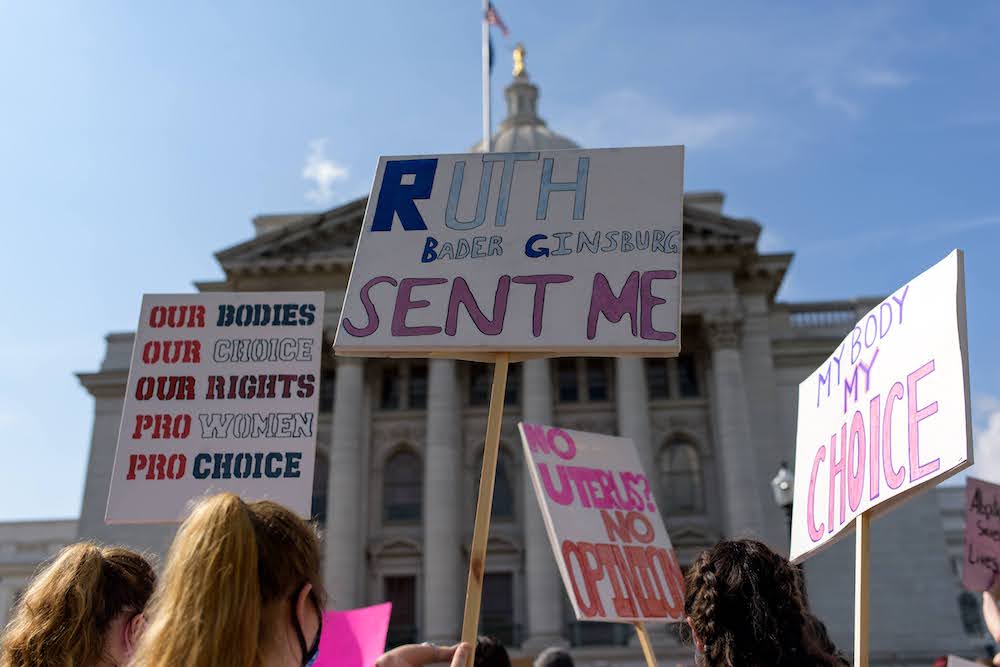
The Freedom From Religion Foundation is warning that today’s fractured Supreme Court decision over Texas’ abortion ban and “bounty hunter” law will encourage other states to engage in legal duplicity when it comes to constitutional rights.
The U.S. Supreme Court today found that abortion providers in Texas could not sue most state officials over the state’s infamous bounty hunter law. In a striking blow against judicial review, Justice Neil Gorsuch wrote for the majority that state court clerks, judges and the attorney general could not be sued. However, eight justices found that suits against state medical licensing officials could proceed.
The challenge of SB 8, involving a ban on most abortions at six weeks of pregnancy, will continue on a narrow basis against officials from the Texas health department, medical board, nursing board and pharmacy board.
In a concurring opinion, Chief Justice John Roberts, joined by Justices Stephen Breyer, Elena Kagan and Sonia Sotomayor, wrote that the provisions “effectively chill the provision of abortions in Texas.” Roberts would have allowed suits to proceed against the Texas attorney general and a court clerk.
Sotomayor, in a scathing separate opinion joined by Breyer and Kagan, noted: “The chilling effect has been near total, depriving pregnant women in Texas of virtually all opportunity to seek abortion care within their home state after their sixth week of pregnancy.” She added, “The court should have put an end to this madness months ago, before SB 8 first went into effect. It failed to do so then, and it fails again today.”
Comments FFRF Co-President Annie Laurie Gaylor: “Texans have been without their constitutional right to an abortion for more than 100 days. It is unforgivable that our judiciary has failed to protect the rights of women and pregnant Texans. The Supreme Court’s actions over SB 8 will continue to cause irreparable harm and encourage other states to adopt similar bans.”
Texas SB 8 authorizes any person to sue anyone who performs, induces, assists or even intends to assist an abortion in violation of Texas’ unconstitutional six-week ban. Anti-abortion plaintiffs may seek at least $10,000 in damages. The Texas Legislature avoided enacting enforcement mechanisms by most state actors to make it as hard as possible for abortion clinics to challenge the law. Instead, SB 8 provides for private lawsuits and procedural mechanisms that grossly favor those suing anyone who assists in an abortion.
“This decision calls into question whether our federal judiciary is willing or able to protect constitutional rights,” says FFRF Legal Director Rebecca Markert. “States may view the ruling as a green light to evade the U.S. Constitution using any number of procedural tricks.”
Sotomayor highlighted the systemic problem with the majority decision:
My disagreement with the court runs far deeper than a quibble over how many defendants these petitioners may sue. The dispute is over whether states may nullify federal constitutional rights by employing schemes like the one at hand. The court indicates that they can, so long as they write their laws to more thoroughly disclaim all enforcement by state officials, including licensing officials. This choice to shrink from Texas’ challenge to federal supremacy will have far-reaching repercussions. I doubt the court, let alone the country, is prepared for them.
She concluded: “The court leaves all manner of constitutional rights more vulnerable than ever before, to the great detriment of our Constitution and our republic.”
Donald Trump promised to choose as president justices who would overturn Roe v. Wade. He subsequently appointed three anti-abortion Supreme Court justices as well as a third of the federal judiciary overall, nominating individuals hand-picked by the Federalist Society for their extreme and Christian nationalist views.
The Freedom From Religion Foundation asserts that the decision today is further evidence that the Supreme Court is broken and requires immediate expansion and reform.
Photo by Chris Line.
